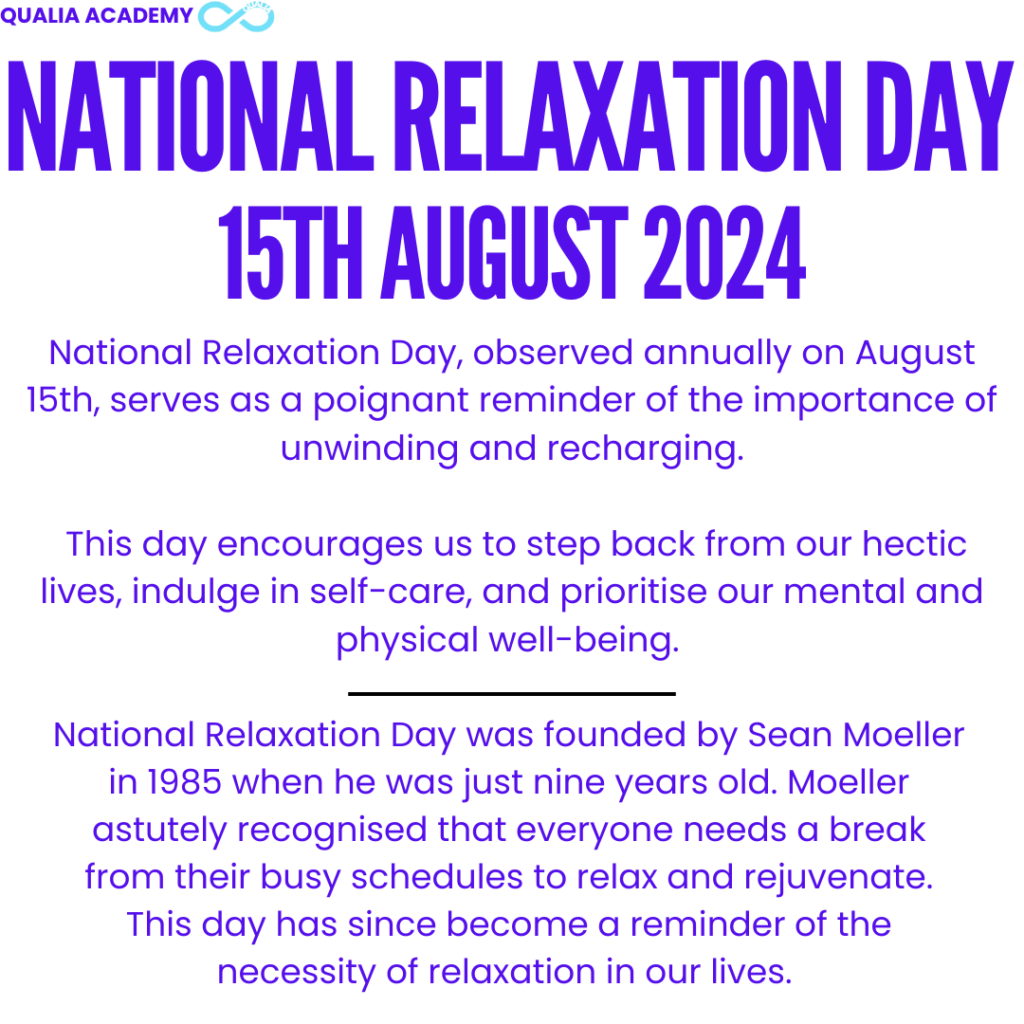The Importance of Relaxation

National Relaxation Day, observed annually on August 15th, serves as a poignant reminder of the importance of unwinding and recharging. This day encourages us to step back from our hectic lives, indulge in self-care, and prioritise our mental and physical well-being.
The Significance of National Relaxation Day
This day was founded by Sean Moeller in 1985 when he was just nine years old. Moeller astutely recognised that everyone needs a break from their busy schedules to relax and rejuvenate. This day has since become a reminder of the necessity of relaxation in our lives.
Relaxation isn’t merely about lounging around; it’s about giving our minds and bodies a chance to recover from the stresses of daily life. Chronic stress can lead to a myriad of health issues, including anxiety, depression, cardiovascular diseases, and a weakened immune system. Thus, taking time to relax is not just beneficial but essential for maintaining overall health.
The Science Behind Relaxation
Relaxation is a physiological process that helps mitigate the effects of stress. When we experience stress, our bodies release hormones like cortisol and adrenaline, triggering the fight-or-flight response. While this response is crucial in dangerous situations, chronic activation due to prolonged stress can be detrimental.
Relaxation techniques help activate the parasympathetic nervous system, which counteracts the stress response by slowing the heart rate, reducing blood pressure, and promoting digestion. This state, often referred to as the “rest and digest” response, allows the body to repair itself and restore balance.
Why Relaxation is Essential
Mental Health Benefits:
Reduces Anxiety and Depression: Chronic stress can lead to anxiety and depression. Relaxation techniques such as meditation, deep breathing, and progressive muscle relaxation can help alleviate these symptoms by calming the mind and promoting a sense of well-being.
Improves Mood: Engaging in activities that promote relaxation can release endorphins, the body’s natural feel-good chemicals, which help improve mood and create a sense of happiness.
Physical Health Benefits:
Lowers Blood Pressure: Relaxation can reduce hypertension, a significant risk factor for heart disease and stroke.
Boosts Immunity: Chronic stress weakens the immune system, making us more susceptible to illnesses. Relaxation helps strengthen the immune response, keeping us healthier.
Enhances Sleep Quality: Stress and anxiety often interfere with sleep. Relaxation techniques can improve sleep quality, ensuring better rest and recovery.
Cognitive Benefits:
Improves Concentration and Memory: Stress impairs cognitive functions such as memory and concentration. By reducing stress, relaxation enhances these cognitive abilities, leading to better productivity and performance.
Promotes Creativity: A relaxed mind is more open to creative thinking. Taking breaks and allowing time for relaxation can lead to innovative ideas and solutions.
Celebrating National Relaxation Day
National Relaxation Day is an opportunity to focus on self-care and find activities that bring peace and joy. Here are some ways to celebrate and make the most of this day:
1. Indulge in a Spa Day
Treat yourself to a spa day, either at home or at a local spa. Enjoy a soothing massage, a refreshing facial, or a long soak in a bath filled with essential oils and bath salts. These treatments can help relax tense muscles, improve circulation, and rejuvenate the skin.
2. Embrace Nature
Spending time in nature has been shown to reduce stress and enhance well-being. Go for a hike in the woods, walk along the beach, or have a picnic in a park. The natural environment provides a calming backdrop, allowing you to unwind and reconnect with yourself.
3. Practice Yoga or Meditation
Yoga and meditation are powerful tools for relaxation. Yoga combines physical postures with breath control and meditation, promoting both physical and mental relaxation. Meditation helps clear the mind of cluttered thoughts, reduces stress, and enhances emotional health.
4. Read a Book
Dive into a good book that transports you to another world. Reading is a great way to escape reality and relax. Choose a genre that you love, whether it’s fiction, non-fiction, fantasy, or romance, and allow yourself to get lost in the story.
5. Listen to Music
Create a playlist of your favourite calming songs and take some time to just listen and unwind. Music has a profound effect on our emotions and can be incredibly soothing. Classical music, jazz, or nature sounds can be particularly relaxing.
6. Watch a Movie or Series
Binge-watch a show or watch a feel-good movie that you enjoy. Sometimes, relaxation means simply sitting back and letting yourself be entertained. Choose something light-hearted that will make you laugh and forget your worries.
7. Disconnect from Technology
Take a break from screens and social media. Constant connectivity can be overwhelming and contribute to stress. Spend some time offline to help reduce anxiety and focus on more meaningful, relaxing activities.
8. Engage in a Hobby
Spend time doing something you love, whether it’s painting, gardening, knitting, or cooking. Hobbies provide a creative outlet and can be incredibly therapeutic. Engaging in a hobby allows you to focus on something enjoyable and take your mind off stress.
9. Spend Time with Loved Ones
Relaxation can also mean spending quality time with family and friends. Plan a casual get-together, have a meal together, or simply enjoy each other’s company. Social connections are vital for emotional well-being and can help reduce stress.
10. Get Plenty of Sleep
Ensure you get a good night’s sleep. Sleep is crucial for relaxation and overall well-being. Create a calming bedtime routine, avoid screens before bed, and make your sleep environment comfortable and conducive to rest.
Incorporating Relaxation into Daily Life
While National Relaxation Day is a wonderful reminder to take a break, it’s important to incorporate relaxation into our daily lives. Here are some tips to make relaxation a regular part of your routine:
Set Aside Time for Relaxation:
Schedule relaxation time just as you would any other important activity. Whether it’s 10 minutes of meditation in the morning or a relaxing bath in the evening, make relaxation a priority.
Practice Mindfulness:
Mindfulness involves being fully present in the moment and can be practiced through activities like meditation, deep breathing, or simply paying attention to your surroundings. Mindfulness helps reduce stress and promotes a sense of calm.
Exercise Regularly:
Physical activity is a great way to relieve stress and promote relaxation. Find an exercise you enjoy, whether it’s yoga, running, swimming, or dancing, and make it a regular part of your routine.
Maintain a Healthy Work-Life Balance:
It’s important to strike a balance between work and personal life. Ensure you’re not overworking and make time for activities that bring you joy and relaxation.
Create a Relaxing Environment:
Your environment can greatly impact your stress levels. Keep your living and working spaces clean and organised, use calming colours, and add elements like plants or soothing scents to create a relaxing atmosphere.
Learn to Say No:
Don’t overcommit yourself. It’s okay to say no to additional responsibilities or social engagements if they’re going to add to your stress. Prioritise your well-being.
Practice Gratitude:
Taking time to reflect on the things you’re grateful for can shift your focus from stress to positivity. Consider keeping a gratitude journal and regularly jot down things you’re thankful for.
Seek Professional Help When Needed:
If you’re finding it difficult to manage stress or relaxation on your own, consider seeking help from a professional. Therapists, counsellors, and stress management coaches can provide valuable guidance and support.
National Relaxation Day is a vital reminder of the importance of taking time to relax and rejuvenate. In a world that often glorifies busyness, it’s essential to recognise the value of slowing down and prioritising self-care. Relaxation is not a luxury; it’s a necessity for our mental, physical, and emotional well-being. By embracing relaxation, not just on National Relaxation Day but throughout the year, we can lead healthier, happier, and more balanced lives.
Here at Qualia Academy, we do Marketing and Management training plus apprenticeships, during our services we aim to ensure that you do not feel overwhelmed at work and find ways to help you.
Contact us if you are interested in our training.









